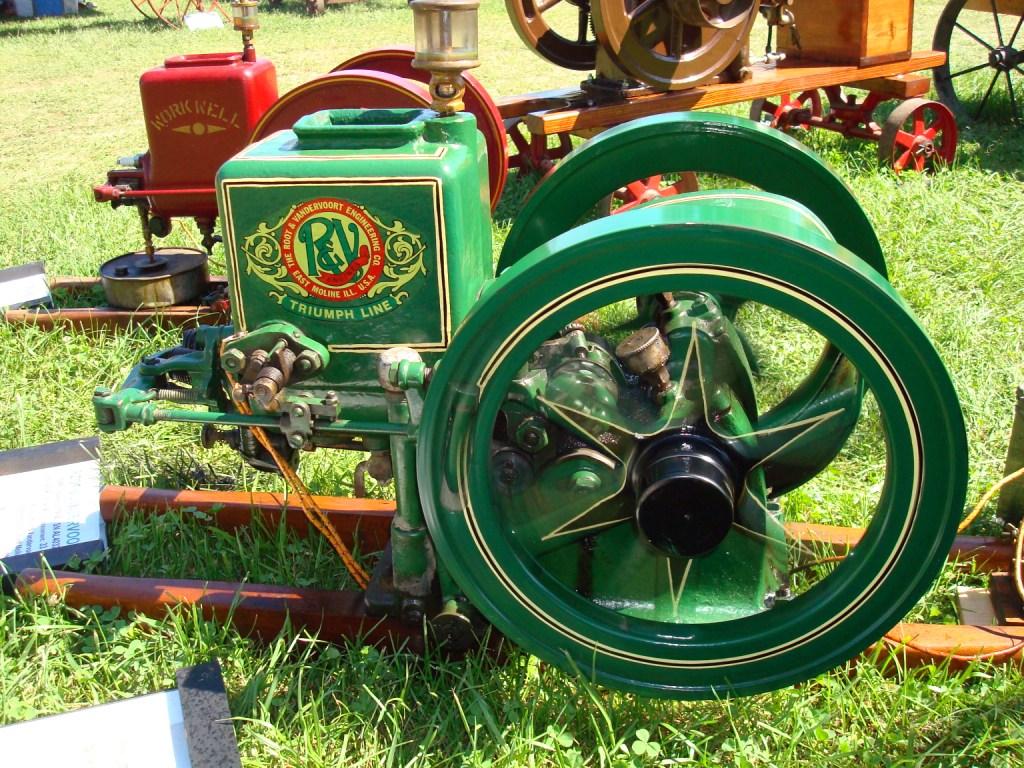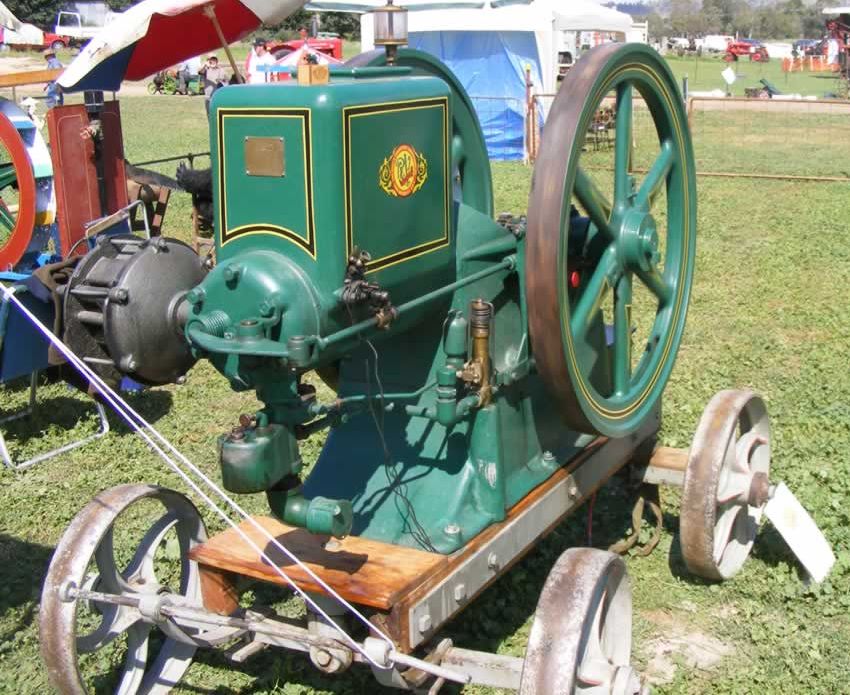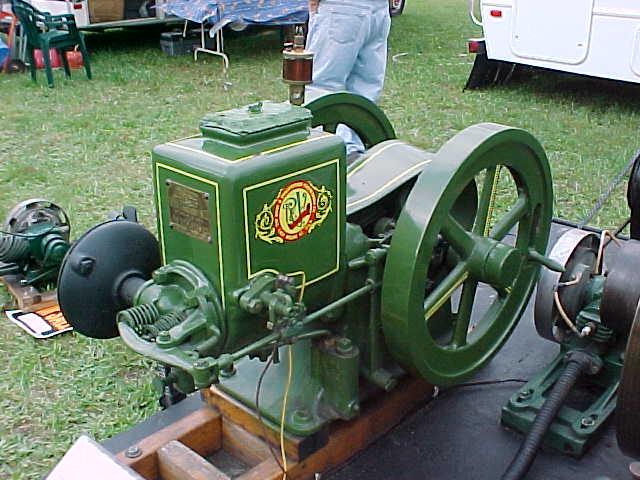
| FEATURED ENGINES | |||||

|
||||||||||||||||||
|
1, 2, 4, 6, 8, 10, 12 Horse Power
The Triumph
L style engines were introduced in 1911 and were available in 1,
2, and 4 horsepower. By 1912 R&V offered 6, 8, 10 and 12 HP. Note: the starting handle in the flywheel - no loose parts. Some of the leading features are Design: We have studied and worked to produce an engine second to none in strength, symmetry and beauty of outline together with durability and smoothness in operation. Hopper Cooled: No tank, pump, piping or fittings required. No air-cooled engine troubles to contend with. Polar ice cream machine or arctic oil may be used in place of water. Cylinder: and bed are cast separately, a special mixture of close-grained gray iron being used. Piston: The piston is usually long, giving large bearing area in the cylinder, and is fitted with four accurately-ground compression rings, one of which is placed over the hardened and ground tool steel piston pin. Bed and Supply Tank: The bed is cast with a solid bottom and top which forms a rigid frame, as well as a perfect receptacle for the gasolene and permits of all pipe connection being made before shipping. Also does away with the small tin can tank usually furnished. Bed is drilled and tapped for attaching our gear pump jack, either when engine is shipped or any time later as desired. Crank Shaft And connecting rod: are steel drop forgings of liberal proportions and finished to standard size. Bearings: Copper hardened genuine babbitt bushings die cast (removable and adjustable) are used on the crank pin and main bearings and are lubricated by means of hard oil cups. An extra long hard bronze bushing is used on the piston end, and works on a tool steel piston pin. Adjustments to these bearings are made by removing metal liners of varying thicknesses. Mixer.. On all Triumph engines, smaller than 10hp, the gasoline is supplied to the mixer by suction, without the aid of a pump. This type of feed permits accurate regulation and requires no attention. The 10hp and larger engines are furnished with gasline pumps, and pumps may be secured as psecial equipmet in the 8hp size. Air throttle.. A small damper in the intake pipe assures prompt starting of engine in extremely cold weather. Gaskets.. Asbestos filled copper gaskets are used for both cylinder and igniter. Igniter.. (make and break) The same rod that opens and closes exhaust valve also trips the igniter. This feature we have covered by US patents and is very valuable, not only for its simplicity, but also from the fact that the igniter is always inoperative when the engine is not taking an explosion, thus saving unnecessary wear on all these parts, and prolonging the life of the battery. Timing of ignition and valve settings are marked on fly wheel Valves.. Both inlet and exhaust valves are made of steel drop forgings. They are located in the cylinder-head, are amply large and ground to seats. Governor... This is of the centrifugal type, with but one weight arm, spring and eyebolt; attaches to balance wheel and forms a very simple, compact mechanism that reduces the possibility of getting out of adjustment to the minimum, and admits of exceptionally close regulation. Speed Control.. The speed of the engine can be increased or decreased at will by means of a knurled thumb screw on top of detent casting, permitting a variation of over fifty per cent in speed while engines is running. Fuel Economy.. All our engines are guaranteed to be as economical in the use of any fuel as any make of engine on the market, and a clause to that effect is placed in our written guarantee. In making comparisons do not lose sight of this important point. Power and Speed.. All our engines are not only fully guaranteed to develop their rated horse-power, but every engine is subjected to a thorough test before leaving the factory, and must show ample power over and above that at which it is rated. The listed speeds at which our different engines should run. are very conservative, and are given merely as the average. The speeds maybe increased form twenty to twenty five percent, which means a proportionate increase in power. Therefore, our engines will develop equally as much, if not more power than any other engines of similar ratings. Accessories.. The engines are equipped with the highest grade accessories that the market affords. Each engine has a solid cast iron gasolene tank sub-base and is mounted on skids with battery box attached containing five number six dry cells, high-grade spark coil with switch, wire, etc., muffler, sight feed cylinder lubricator, four wrenches and oil can; also instructions for starting and taking care of engine. |
|||||
 |
 |
||||
| 1hp L Style engine AL | 12hp L style engine GL | ||||
 |
|||||
| 4hp L style engine CL | 2hp L style engine BL | ||||
| How do I identify my Triumph L engine size ?
|
Other Information. All L style engines sizes use the same size ignitor.
|
||||
| Any
communication to owners of R&V engines can be made through Site Custodian. Official R&V Web Site © 2000 - 2023 |
|||||